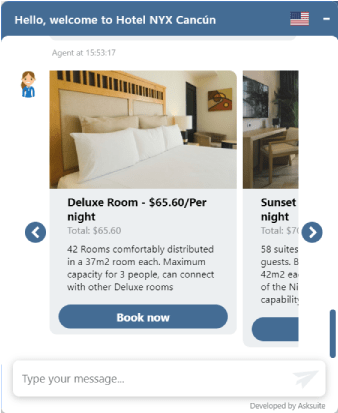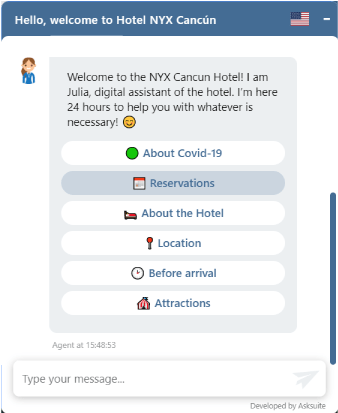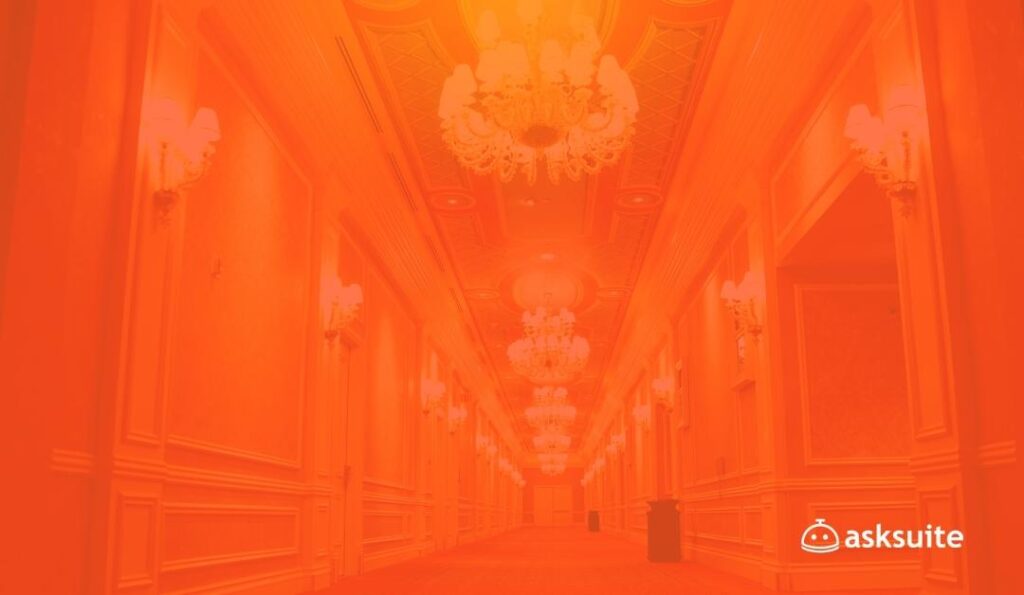There are many possible hotel industry trends, both inside and outside the rooms. Virtual assistants, augmented reality, Airbnb, Internet of Things. New technologies, new players, new kinds of experiences. Dizzy already, hotelier?
Things are changing fast and it’s hard to keep up. Hotel techs raise the bar in terms of the guest’s expectations, and players like Airbnb have messed up the travel industry. Too much is going on and it’s hard to know where hotels should bet their money on.
Add to this scenario, this year’s COVID-19 pandemic. This health and financial crisis has accelerated the movement towards hotel techs. Most of the hotels around the world had to downsize while keeping hotel operations running. Plus, with the risk of contamination, guests are now requiring contactless experience in processes that can be automated, like check-in, check out, or concierge service, for example.
But, no more confusion! To help you decide which path you should take in terms of investments and business strategies, we put together this list with the top 6 trends in the hospitality industry. It comprehends technologies and market trends and will give you an overall picture of the hotel business.
If you tackle these trends, you will be better prepared to win the battle for travelers in 2020 and your hotel will definitely be in front of the competition. Without further ado, let’s check the list!
6 Hotel Industry Trends
1 – Voice Search
Voice search is the technology that allows users to search on the internet by a voice command to ask questions on mobile devices or a computer.
 If you struggle with SEO techniques and thought that the battle for Google ranking was brutal, I have good news and bad news.
If you struggle with SEO techniques and thought that the battle for Google ranking was brutal, I have good news and bad news.
The bad news is that now you have another kind of ranking to be worried about that is becoming as important as the traditional one: the voice search ranking.
The good news is that still few companies are paying attention to it, so you have bigger chances to master this voice-ranked list and attract news consumers.
Your first thought might be that: “this is not now, it’s future”. But don’t be mistaken: this kind of search is growing fast and it’s definitely a marketing trend that your hotel should invest in. I will show you why.
The world around us is voice-activated. Amazon and Google have been investing heavily in this kind of technology and Google even allows travelers to use voice search to book and manage flights and hotels. If you are still not convinced about the importance of voice search, let me show you some facts:
- 58 % of US consumers had used voice search to find a local business in the last 12 months;
- 88% of users who are looking for a local business will also ask for driving directions.
Imagine this: a traveler arriving in a new city by car late at night. He hasn’t booked any hotel yet. He asks Siri for a hotel to stay in the neighborhood as he drives the car to a destination. Can you see how the impact of the voice search on your room occupancy rate, especially in late-minute bookings?
That is why it’s so important for hotels, and local businesses in general, to be easily discoverable in voice search results. That way hotels can guarantee to be ahead of their Compset at this early stage of the search revolution.
Not to mention that with the pandemic, many travelers prefer road trips to fly. It is less risky. And with the uncertainty that surrounds us, to get the road and book a hotel in the way will probably happen more.
Road trips are still a trend in 2021. Wanna know what trends to follow in 2021? Go to our post “Hospitality Trends in 2021: Are They Here To Stay?” and find out!
OK, so now you agree with me that the voice search is a trend to keep an eye on. But how can you prepare your hotel for this trend?
Even though you can’t optimize your content exclusively for voice search, there are many things you can do to make sure your website is on the radar. Optimizing for voice search means a different keyword research strategy, which leads to writing the content in a different way.
Basically, you should write the text the same way you talk and the keywords should be in the first paragraph of your web page. The main difference between traditional SEO strategies and voice search is that the content should be based on questions, almost like a FAQ.
Your content must answer key questions in a simple and direct way, so when the user asks Alexa or Siri, it can find it easily.
Need help with copywriting to make your content more attractive? Worry no more! Download our free ebook and learn quick improvements to better results:
To finish this topic, I leave you with this information to think: according to Gartner, about 30% of all searches will be done without a screen by 2020. That changes the reservation game, don’t you think?
2 – AI Chatbots
A chatbot is a tool created to simulate a human conversation via a chat interface powered by Artificial Intelligence.
 Convenience is everything for today’s consumers and chatbots can be a great facilitator in this area. It’s no wonder why self-services and online supports are growing fast all around the world.
Convenience is everything for today’s consumers and chatbots can be a great facilitator in this area. It’s no wonder why self-services and online supports are growing fast all around the world.
Chatbots can deliver a more seamless experience since pre-stay. After all, the first impression counts, right?
We live in an era of communication by texting. No one wants to call a company anymore, let alone to have to wait in line to speak to an agent. This is one of the reasons why chatbots are great: they can provide the kind of service your clients actually want!
Customer service is vital for the hotel business. Nevertheless, a mistake many hotels make is to only pay attention to the service provided at the hotel, ignoring the pre and after-stay. Remember: guest experience starts before arrival.
It’s through pre-stay customer service that you get to know your clients and collect valuable data, enabling you to perform a top-class personalized service even before your guest gets to the front desk.
But convenience goes beyond automated customer service. It is also the key when it’s time to book a hotel. In fact, more and more guests are completing the entire booking process on their smartphones, which means hotels must have mobile-friendly websites and should be able to retain online visitors.
By taking away instantaneously all possible questions clients might have before booking a hotel, chatbots, like Asksuite, can boost the hotel’s direct bookings. Integrated with booking engines, chatbots can show clients all the rooms available (with images) in a matter of seconds, engaging users and even teaching them that direct bookings have the best rates.
It can also suggest other available dates (when the one selected has no rooms available) and even another hotel in the same hotel chain.

Especially now with the pandemic, when people are hesitating to travel again. Travelers need all reassurance they can have about the hygiene protocols and the hotel’s operations before booking a room. More than ever, your hotel needs to be available to capture these potential guests by providing the answers they are looking for:

Asksuite’s chatbot provides a COVID-19 topic where hotels can put all the information for their guests and potential guests regarding the procedures and operations during this pandemic.
➡ Did you know that Asksuite won as Best Chatbot in the world by Hotel Tech Awards in 2020 & 2021? Learn more about the chatbot and the award: [Best Hotel Chatbot]
3- Augmented Reality and Virtual Reality
Augmented Reality is the technology that alters a person’s perception of their physical surroundings through the use of technologies.
Guest experience is the core of the hotel business, right? Providing the best experience is a good way to make your hotel succeed and prosper. So more than rooms or products, your hotel should focus on selling experiences.
The main goal of Augmented Reality is to provide fun experiences and that is why this hotel tech is becoming more popular. Amazing images are not enough anymore to attract and retain customers. You need to go beyond. Starwood, Marriot, and Holiday Inn are already making a difference in the industry by leveraging this technology.
What does it work? Augmented Reality blends the digital and physical worlds, simulating the perfect experience for the guest. Not only do guests get more information before booking a hotel room or a tour, but this technology can add fun to the entire process.
This hotel technology can be used not only to sell the products of the hotel but it can also to enhance the experience guest would get in the area where the hotel is located. In other words, it can be used before the stay and in the stay, offering interactive elements within hotel rooms.
And if you think that this kind of technology is only for Disney’s amusement parks, think again. By the year 2025, this market size will reach $198 billion, and the hospitality industry is going to be one of the major players that helps AR reach this revenue goal.
I bet you played Pokemòn Go or at least know someone who did it. Slowly but surely, Augmented Reality is becoming part of our lives. And the hotel industry can benefit a lot from it. Augmented Technology is great to engage customers and guests.
Engaged clients mean loyal clients and clients that spend more money with you.
In this episode of the Hotel Cast Podcast, we talk with Craig Carbonniere, Senior Director of Sales at Milestone and one of HSMAI’s Top 25 Extraordinary Minds in Hospitality Sales, Marketing, and Revenue Optimization, on how guest experiences can drive revenue. Listen here:
4 – Internet of Things (IoT)
Internet of things (IoT) means the ability to connect any device with the internet, allowing central control of the in-room amenities and facilities, giving guests the convenience they are seeking when staying in hotels.
 Picture this: John gets a uber home from work. He enters his apartment and turns on the lights and the air conditioning through voice-assistance devices. After a shower, he orders food on his mobile and throws himself comfortably on the couch to watch his favorite tv-series on Netflix.
Picture this: John gets a uber home from work. He enters his apartment and turns on the lights and the air conditioning through voice-assistance devices. After a shower, he orders food on his mobile and throws himself comfortably on the couch to watch his favorite tv-series on Netflix.
This is not an episode from The Jetsons. This is John’s life (and maybe yours?).
It’s not a chock that when traveling for business, John expects the same life quality and routine. After all, isn’t the hotel a “home away from home”? That’s why it’s imperative that your hotel be aware of the changes technology created in every aspect of our lives, including travel.
Therefore hotels need to be tech-friendly if they want to succeed. Through smart devices or voice assistants, guests are able to perform tasks such as setting timers, alarms, playing music, or controlling smart devices in the home such as lighting. Marriott and Hilton are two examples of hotel chains that are investing in IoT.
And again, with the COVID-19, this kind of technology is becoming a must-have, since it reduces the risk of contagion at a hotel by eliminating devices like remote controls, that can be a source of contamination. Through voice assistants, guests can control activities in their rooms risk-free, and they will surely appreciate the hotels’ efforts to keep guests safe.
However, unfortunately, IoT is not all roses. People are worried about how companies collect and share their data, which extends to voice assistants. Amazon has reported that employees listened to the recording of users’ private conversations with Alexa, which lift a red flag.
In this CBS video, experts and hotels professionals debate on the benefits and risks of the IoT:
Security and privacy are two key aspects of this technology and hotels must be well prepared for it.
5 – Sustainability
Sustainability is more than just a trend. It’s a way of life incorporated by millions of people and that has a strong impact on tourism.
Besides convenience, IoT brings another benefit: it can save energy. Smart devices enable hotels to be energy efficient, saving the environment and thousands of dollars. Focusing on sustainability is good for guests and for the hotel business.
More than luxury, being an eco-friendly hotel is a must. After all, guests expect green products and services. There are many actions a hotel can take to become more “green”.Here are some examples:
- Water efficiency;
- Motion sensors;
- Solar Power;
- Plastic Reduction

Hotel brands with a holistic focus on eco-friendliness are considered “green,” such as Marriott’s Element brand and the luxe 1 Hotels.
Google has already spotted this trend and has included sustainability as one of the filters travelers see when searching for a hotel to stay.
But as I said before, going green is more than just a trend. For some, it is considered a moral imperative. According to the Cambridge Institute for Sustainability Leadership, tourism contributes about 5% of global greenhouse gas emissions — a figure they expect to grow by 130% by 2035.
Wiith the expectation of the growth of the industry over the following years in terms of the number of rooms and properties, it will be definitely a challenge to reduce gas emissions and achieve complete decarbonization by 2050 as originally planned.
6 – Airbnb & Hotels
Airbnb changed the hotel industry game. Now there are people who want experience travels as locals, but at the same time, there are till also many people that want some comfort that a hotel can provide.
It’s undeniable that before the pandemic, there was a boom in home-sharing. And Airbnb took full advantage of it, growing at a fast speed and stealing market share.
Some players are already moving to grab this opportunity these changes bring, attracting both groups of people in a combination of styles. Sonder is a great example of that, offering a hybrid hotel-Airbnb experience, giving users a hotel room experience without the rest of the hotel.
Blending aspects of hotels and vacation rentals, Sonder offers short-term rentals with hotel amenities, like concierge service. Sonder leases and renovates apartments in trendy city neighborhoods, and rents them to customers through Airbnb, Expedia, and its own site.
Recently, during the COVID-19 pandemic, the company has raised a $170 million Series E round. This is very impressive considering that the unpreceded crisis that hit the hotel industry and shows the market that this trend is here to stay.
However, social distancing, hygiene, and refund policies might change the game again! The financial global crisis, especially in the Tourism sector, forced Airbnb to a recent layoff of a quarter of its workforce. In fact, both hotels and home sharings are struggling. The question is: who will be able to convince travelers that is safe to stay with them?
The point is that the consumer’s interest is shifting and the industry must adapt. In fact, adaptation is the key to the success of any business in any industry. To be stuck in the traditional way of hospitality is certainly not a smart move. Adjust, adapt, evolve, and win!
Hotel industry trends: are you ready?
Technology is shaping, enhancing, and easing the travel experience. Keeping an eye on what’s going on in the industry and keeping track of the changes is a good way to start to be prepared for what is coming next.
More than ever, to be ready for what the future brings, you need to know what is available on the market and what travelers desire so you can decide which path to follow- and which trend to invest in.
Furthermore, although the guest experience is still on focus, it’s imperative to know that the field and players of the industry have also changed. And you need to know the rules to win the game.
I hope that now that you have this vital information, you can get to work and get ready to enchant guests and dominate the market.
*updated on 10-21-2021
Working in silos is so last year! In this free episode of the Hotel Cast Webinar Series, we chat with Jonathon Liu (Director of Revenue & Marketing Strategy at glh Hotels) and Waldin Duran (Director of Sales at BTH Hotel Boutique Concept) about the importance of connecting Sales and Marketing to optimize your hotel revenue. Plus, we give you tips on what to consider to create your own strategy:





